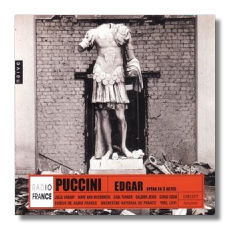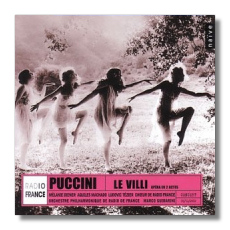
The Internet's Premier Classical Music Source
Related Links
- Puccini Reviews
- Latest Reviews
- More Reviews
-
By Composer
-
Collections
DVD & Blu-ray
Books
Concert Reviews
Articles/Interviews
Software
Audio
Search Amazon
Recommended Links
Site News
 CD Review
CD Review
Giacomo Puccini

First Operas
(Libretti by Ferdinando Fontana)
Edgar
- Melanie Diener, soprano
- Aquiles Machado, tenor
- Ludovic Tezier, baritone
- Sylvie David, narrator
Choeur de Radio France
Orchestre Philharmonique de Radio France/Marco Guidarini
Naïve V4957 2002 Radio France DDD 67:40


Le villi
- Julia Varady, soprano
- Mary Ann McCormick, mezzo soprano
- Carl Tanner, tenor
- Dalibor Jenis, baritone
- Gualtiero Carlo Cigni, bass
Maîtrise de Radio France
Choeur de Radio France
Orchestre National de France/Yoel Levi
Naïve V4958 2002 Radio France DDD 2CDs: 52:22, 41:29
Le Villi is based on the legend of the Wilis – also known as "Willis" and, one assumes, "the willies." These are jilted maidens who, after dying of grief, return to earth as lovely but vengeful spirits to dance their faithless lovers to death. Adolphe Adam's Giselle comes from the same drawer. This was Puccini's first opera, and his only encounter with a supernatural subject. He completed it in 1883 when he was twenty-five years old. It is not a popular work – I believe this is only its third commercial recording – but there's much in it that's attractive. Briefly, Black Forest sweethearts Anna and Roberto are engaged to be wed. He travels to Mainz to collect an inheritance, and while he is away, he falls under the spell of a "seductress." He tarries, and Anna dies of a broken heart. The regretful Roberto returns to his village on a winter night. Anna, accompanied by a band of Wilis, lays his guilt at his feet. The opera ends with the "undead" Anna and her horde drawing Roberto into their fatal dance. "You are mine!" are her final words. For the composer, who later had a knack for humiliating his most famous heroines, this ending is something of a surprise: a Puccini tenor actually is held accountable for his actions!
Puccini's first great soprano aria occurs in Act One, as Anna wishes she could be as small as the flowers she is giving Roberto, so she could be with him always. An orchestral interlude depicting a Witches' Sabbath was popular at the opera's première, but it's not much scarier or more original than the rather lame ballet music that Verdi wrote for Macbeth's witches. Le Villi is mostly conventional and seldom inspired, but Puccini's talent for melody already is apparent; it would take him a few years before the talent became a true distinction.
The RCA Victor recording of Le Villi (with one act of Edgar) was never transferred to CD. I haven't heard it, but I understand that's no great loss. Most people, if they know Le Villi at all, know it through the CBS Masterworks CD (MK76890 or MK36669) with Renata Scotto, Placido Domingo, and conductor Lorin Maazel. It was recorded in 1979, and it finds the singers in good voice (taking Scotto's age into consideration) and the conductor at his most lively. Veteran Tito Gobbi is on board to speak the Narrator's 24 lines of rhymed verse – an awkward response to the libretto's failure to explain Roberto's protracted absence and just who these darned Wilis are. This new recording, unlike the one from CBS, is live, recorded by Radio France in March 2002. It features a really lovely soprano (Mélanie Diener is a more credible jilted maiden than Scotto) and a pleasantly smoky tenor in Aquiles Machado. I hope to hear more from both of these singers. Ludovic Tézier, as Anna's father, doesn't have the authority of Leo Nucci on CBS. The (female) Narrator speaks her lines beautifully. Conductor Marco Guidarini, who recently conducted at the Met, is a mellower alternative to Maazel. All in all, this recording really is quite fine, although I could understand wanting to hang onto the CBS for its celebrities.
In Edgar, one can hear Puccini growing in mastery and confidence. Each of the three acts is better than the one that preceded it, and Act Three is wonderful indeed. As a matter of fact, I don't think Edgar is significantly inferior to Manon Lescaut, which is commonly regarded as the composer's first "great" opera. The thing that has held Edgar back, in my opinion, is its silly plot, in which the titular main character vacillates for no particular reason between nobility and baseness. Sticking up for your village's Bad Girl is one thing, but burning your house down and running off to an orgy with her is something else. (Yes, Act Two starts with an offstage flesh-fest, and if only some daring director were to bring it onstage, then surely we'd have a hit.) While Edgar shifts allegiances at the drop of a doublet, the other characters are stock figures, as suggested by their names: faithful Fidelia and the tigerish gypsy Tigrana. Never mind, though, because there's lots of juicy music here, and lots of drama too. For example, try Fidelia's aria "D'ogni dolor" in Act Three, and later, the scene in which Edgar (dressed as a monk!) and Frank (Fidelia's brother and Tigrana's former lover!) tempt Tigrana with jewels. The last act's moving prelude was played at Puccini's funeral. Surely there's more gold here than dross.
For about twenty-five years the reference recording of Edgar has been the one recorded live in Carnegie Hall with conductor Eve Queler, Carlo Bergonzi as Edgar, and soprano Renata Scotto as Fidelia (CBS MasterworksM2K 34584 or 79213). Both the tenor and the soprano were in vocal decline by then, but they were not shy about wringing out all of the music's passion in an authentically and excitingly Italianate manner. They were complemented by a fine Tigrana (Gwendolyn Killebrew) and Frank (Vicente Sardinero), and Queler was no wilting violet either. In this new live recording (December 2002), also from Radio France, Levi's tempos are similar to Queler's, but he conducts the music less pungently. Julia Varady, also in the waning years of her career, imitates Scotto by pretending she's a fiery 30-year-old, and it almost works – the vocal shortcomings, rather than making one shudder, encourage one to root for her. Tenor Carl Tenner strains and is nothing special, but it's tough to be compared to Bergonzi. Apart from Varady, the other standout is Mary Ann McCormick, who has a good time with the "not quite Carmen" gypsy-isms of Tigrana. Overall, the performance has a softer focus than the one from Carnegie Hall, but it's a good alternative reading for those who like this score, and it is brightly recorded. (But so is the Queler.) I wouldn't go without either. Interestingly, the French audience seems a little nonplussed by the music, while the New Yorkers go for it like hungry cats fighting over some tuna. A point against the Naïve release is the booklet, which is full of typos and poorly translated English.
Copyright © 2003, Raymond Tuttle




















